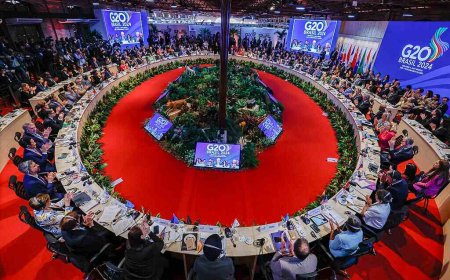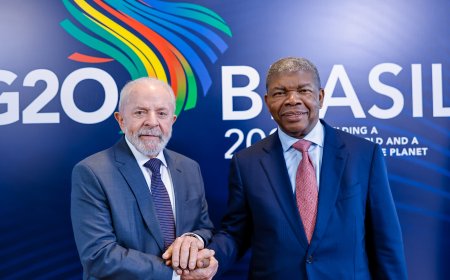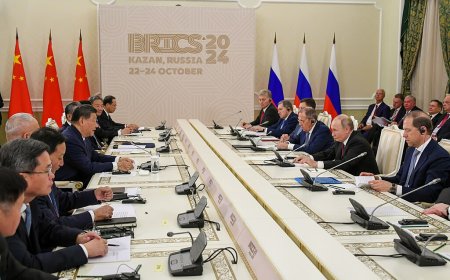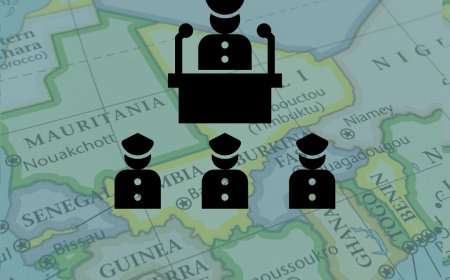This article is part of a series on the Nigerian 2023 Elections. The series is edited by Serwah Prempeh and Dr. Olumide Abimbola.
Summary
- Addressing the economic and security situation in Nigeria has dominated presidential campaign manifestos, with little mention of climate action
- More imminent challenges are likely to preclude significant public investment in climate change mitigation and adaptation
- Unsustainable fossil fuel subsidies are expected to be reduced, making renewable energy solutions more competitive
- Government can reinstate tax and duty exemptions for solar solution components to improve the environment around the renewable energy industry
-
Existing government initiatives in the power, agriculture, and transport sectors can be adapted to advance climate action at modest cost
Background
Over the past year, the just-conducted presidential elections have dominated Nigerian media coverage. Candidates’ track records in political office, manifestos, and campaign trail speeches have been endlessly scrutinised as voters assessed who has the ideas and competence to realise Nigeria’s long-touted economic and industrial potential. Notably absent from much of the debate was climate change, an issue increasingly central in political commentary globally. At first glance, this absence was to be expected due to the myriad of more imminent economic and social challenges the country faces. Pipeline vandalism, theft, and underinvestment reduced oil production to an average of 1.1 million barrels daily (mbpd) in 2022, several hundred thousand barrels less than the OPEC quota of 1.8 mbpd.[1] The dwindling crude export revenues have compounded a mounting debt burden and a US$10 billion fuel subsidy bill draining government coffers.[2] Widespread violence and insecurity have pervaded all regions. High inflation and currency devaluation have created a cost-of-living crisis that limits the government’s policy options to reduce public spending (such as eliminating fuel subsidies). A poorly planned currency redesign has recently exacerbated the nationwide economic malaise.
The manifestos of the three leading presidential candidates indicated that the new government will be preoccupied with addressing the outlined challenges in the next four years, with seemingly less scope for climate action.[3] However, by their admission, climate change has directly contributed to Nigeria’s crises.[4] For example, the early and unusually heavy rains of 2022 led to devastating floods that washed away homes and farmland in 34 of 36 states, displaced 2 million people, and fuelled food inflation. A study by researchers with the World Weather Attribution initiative concluded that climate change had made such flooding events across West Africa more likely and intense.[5] Similarly, extreme heat and erratic rainfall, both consequences of climate change, have intensified resource competition between farmers and herders and shifted traditional migratory patterns.[6] Due to deep-rooted ethnic and religious tensions, agrarian-based competition has escalated into communal clashes and armed conflict. Climate change is thus of great consequence to Nigeria’s stability and key job-creating and revenue-generating sectors: agriculture and oil and gas (through the energy transition).
Driving down the cost of renewables
The transformation of the global economy from reliance on fossil fuels to cleaner energy sources, often referred to as the energy transition, is critical to climate change mitigation. The transition has been initiated in most countries, though rates of progress have varied significantly. In industrialised economies, renewable energy adoption has been primarily driven by government incentives, including renewable energy quotas, tax incentives, feed-in tariffs, loan guarantees, and investment grants.[7] Similarly, cost reductions in solar panels and components—75% in the past decade—resulted from long-standing Chinese subsidies for solar manufacturing.[8] However, Nigeria’s dire public finances limit its ability to implement similar renewable energy support policies. For example, even before the current economic crisis, 14 power purchase agreements (PPAs) for 1,125 megawatts of on-grid solar projects were shelved for over 5 years partly due to the government’s inability to provide payment guarantees.[9] Moreover, the worsening liquidity crisis and socioeconomic challenges make it more unlikely that significant public investment will be channelled into the renewable energy sector. However, there is less capital-intensive yet potentially transformative climate action that Nigeria’s new president can undertake.
Before 2018, renewable energy generation equipment was purportedly eligible for exemptions to value-added tax (VAT) and import duty. However, solar developers complained of poor implementation and delays in obtaining these exemptions. Rather than resolving the challenges, the Ministry of Finance and Nigeria Customs Service rescinded the policies altogether, resulting in 15-40% higher retail prices for solar solutions.[10] An ACETAF (African Clean Energy – Technical Assistance Facility) study calculated that the improved energy access and job creation that would have resulted from cheaper solar products outweighed the tax revenues forgone by the government. Thus, with Nigeria’s nascent solar industry being heavily import-dependent, reinstating the fiscal incentives for solar products is a no-brainer for the incoming president.
That cost-reduction strategy will be especially effective when considering fossil fuel market trends. In the aftermath of the Russia-Ukraine conflict, diesel prices tripled and have not retracted despite lower global oil prices. Furthermore, there is increasing consensus that the petrol subsidy is unsustainable—not only does it pose a substantial fiscal burden but it also creates room for the misappropriation of public finances. Although a gradual phaseout is more likely than a sudden withdrawal, higher pump prices for petrol are still expected, which (together with pricier diesel) will make running generator sets more expensive. Consumers will seek alternative energy sources, so decreasing the upfront cost of solar solutions, a significant barrier to adoption, is critical.
Developing the enabling infrastructure for renewables integration
Nigeria could more rapidly scale its renewable energy generation through cheaper, utility-scale solar projects (>50MW). These typically lead the energy transition elsewhere; however, Nigeria has not built grid-connected solar, partly due to the poor transmission and distribution infrastructure quality, which cannot manage the variability solar adds to the national grid. Consequently, successes have only been recorded in building off-grid renewable energy systems for rural electrification. While these systems improve energy access, they are significantly more expensive and difficult to scale—six years of interventions have yielded less than 250MW of new capacity.
The Presidential Power Initiative (PPI) is a partnership between the Nigerian government and Siemens Energy AG (facilitated by the German government) to upgrade energy infrastructure, mainly to improve system monitoring and transmission capacity from 5 to 25GW by 2025.[11] However, unlike the privatised power generation and distribution segments of the electricity supply industry, the transmission network remains state-owned. Consequently, improvements have depended on public investment, which has lagged behind expectations due to the broader liquidity challenges facing the entire value chain. German banks are expected to provide 85% of the PPI’s funding through concessional loans, with the Nigerian government contributing the rest. While it is common for landmark initiatives of one administration to be abandoned after a power shift, the PPI presents an opportunity to build critical infrastructure that will enable the integration of renewables and, thus, the energy transition. The new administration should honour the agreements signed and ensure its counterpart funding is made available to guarantee their continuity.
Mainstreaming climate smart agriculture interventions
Another “easy win” presents itself in the agriculture sector, which is responsible for 23% of Nigeria’s greenhouse gas (GHG) emissions and is uniquely vulnerable to climate change impacts such as extreme weather events.[12] The Buhari administration channelled significant resources to the sector to spur local food production to substitute imports. For example, the Anchor Borrower’s Programme (ABP) sought to improve smallholder farmers’ access to finance and quality inputs through concessional loans and a government-approved network of input suppliers.[13] Although the ABP and similar past interventions have been susceptible to the corruption that plagues many subsidy-based programmes, they have often established far-reaching networks of sector stakeholders and frameworks for engagement and knowledge-sharing. Such networks present an opportunity to upskill smallholder farmers on climate-smart agriculture methods, including adopting flood- and drought-tolerant seed varieties, installing early warning systems for weather, training beneficiaries on farming practices to improve land productivity, etc. Building these measures into existing programmes also reduces the cost and institutional resources needed to create impact.
Perhaps the simplest, yet most important, task for the new president is to chart a new energy vision for the country—one that recognises the low-carbon paradigm that the world is in yet prioritises building industries that are competitive and ensure local value addition and job creation. At COP26 in Glasgow, President Buhari surprisingly announced a 2060 Net Zero ambition for Nigeria. The McKinsey-created Energy Transition Plan underlying this commitment requires a rate and scale of investment, technology deployment, and market creation with no historical precedent in the country’s power and industrial sectors, even during the most prosperous economic growth (the early 2000s). Furthermore, it relies heavily on establishing industries in which Nigeria currently has no competitive advantage, such as electric vehicles and hydrogen. A dose of realism is needed in planning to avoid lock-in to suboptimal transition pathways. Such an effort requires modest investment but significant institutional capacity and far-reaching stakeholder engagement to understand what is possible, given Nigeria’s limited resources and stage of development. The nation’s position as an economic and political juggernaut in the ECOWAS and AU also allows it to spearhead what a just and equitable transition means for a resource-rich country in sub-Saharan Africa.
Government should prioritise infrastructure projects that will unlock private investment in the energy transition
Other infrastructure projects hold great potential to drive down GHG emissions. However, they are more complex to deliver because of the investment needs, for example, in the transport sector, which accounts for 16% of GHG emissions. Inefficient internal combustion engines abound on the streets in Nigerian urban centres, spewing much carbon dioxide and other harmful pollutants. In recent years, Abuja and Lagos have built light rail systems to make transport more accessible and affordable for the working population. However, poor planning of the Abuja rail routes—they fail to cross residential, economic, and social activity centres that people travel to daily—has meant the network is grossly underutilised. The Lagos system has just been launched, so its effectiveness is yet to be assessed. Despite the initial failures of some mass transit projects, improved planning could shift behaviour from individual vehicle use to mass transport and reduce emissions associated with transportation. There is precedent for this in the country too. Lagos’ Bus Rapid Transit System reduced GHG emissions by 20%.[14] Fuel scarcity and higher prices have persisted through 2022 and will only further incentivise demand for public transport. Furthermore, with the removal of the fuel subsidy, transportation costs will rise significantly, so there is an opportunity to usher in behaviour change if the appropriate transit infrastructure is built. The federal government does not have direct jurisdiction to build some state projects but can provide loan guarantees and facilitate other financial support. For example, Lagos’ blue line rail project received N110 billion (US$ 239 million)[15] in financing from the Central Bank of Nigeria (CBN) through one of its intervention funds.[16]
Similar financial support is needed for large-scale renewable energy projects. Seven years after signing the earlier-mentioned 14 solar PPAs, the projects have failed to materialise due to tariff disputes and a failure to secure partial risk guarantees requested by the developers.[17] High indebtedness, the perceived risk associated with a nascent solar industry, and a fear of reputational risk resulting from any default on its obligations have discouraged the government from approving the PPA guarantees.[18] However, the public and donor investment being channelled into the off-grid renewable energy sector is insufficient for the gigawatt-scale of impact to which Nigeria aspires. In addition, off-grid electrification—through mini-grids or standalone solar solutions—does not have the same mitigation potential as displacing diesel generators through a greener grid supply to large consumers. Therefore, the new government should prioritise de-risking utility-scale renewable energy projects.
Conclusion
There are many transformative climate change mitigation and adaptation measures not discussed above, not because of their lack of effectiveness but due to a lack of precedent—whether from regulatory frameworks, institutional capacity, or know-how—making them harder to implement. Some examples include scaling green investments through the Africa Carbon Markets Initiative (ACMI) announced at COP27; building infrastructure for green hydrogen production, currently being urged by the German development agency; accelerating the transition from wood fuels to clean cooking, amongst others. However, given the dire state of public finances and more imminent crises that need to be addressed, it is improbable that climate change would be at the top of the new president’s agenda. Thus, this article has highlighted existing government efforts that the new administration can improve upon to accelerate climate action. Relatively modest investment is needed to improve the enabling environment for clean energy technologies and de-risk large-scale projects that could be transformational for energy access and reliability. Many developing countries are trying to understand what the low-carbon transition means for the competitiveness of their economies and development pathways. Nigeria is well placed to lead the vision of what a just transition should look like for the continent.
- Nigerian Upstream Petroleum Regulatory Commission (2023) Oil production status report.
- Eboh, C. (2023) Nigeria's NNPC spent $10 billion on fuel subsidy in 2022, Reuters. Thomson Reuters
- Oguntuase, O. (2023) Where do Nigeria's frontrunners stand on climate change?, African Arguments.
- Mojeed, A. (2023) Nigeriadecides2023: Climate change policies of leading presidential candidates unconvincing, Premium Times Nigeria.
- Zachariah, M. et al. (2022) Climate change exacerbated heavy rainfall leading to large scale flooding in highly vulnerable communities in West Africa. Working paper. Worldwide Weather Attribution Initiative.
- International Crisis Group (2022) The Climate Factor in Nigeria’s Farmer-Herder Violence.
- Fruhmann, C. and Tuerk, A. (2014) Renewable Energy Support Policies in Europe. Climate Policy Info Hub.
- Shellenberger, M. (2021) China helped make solar power cheap through subsidies, coal and allegedly, Forced Labor, Forbes. Forbes Magazine.
- Ehanmo, I. (2017) Boosting Nigeria's solar energy mix portfolio: Significance of the put and call option agreements. Businessday NG.
- Africa Clean Energy Technical Assistance Facility (2021) Impact Assessment of VAT and Import Duty Exemptions for Stand-Alone Solar in Nigeria. ACETAF.
- Siemens Energy AG (2022) Presidential Power Initiative Nigeria.
- Climate Watch Historical GHG Emissions. 2022. Washington, DC: World Resources Institute.
- NIRSAL Microfinance Bank (2023) Anchor borrowers' program.
- Peltier-Thiberge, N. (2015) Lagos' Bus Rapid Transit System: Decongesting and Depolluting Mega-Cities, World Bank Blogs.
- Using the Central Bank of Nigeria’s official exchange rate of NGN460 to US$1
- Moses-Ashike, H. (2021) CBN Finances Lagos Blue Line Rail project with N110bn, Businessday NG.
- Akanonu, P. (2019) How to resolve the tariff disputes blocking Nigeria's Solar Project Pipeline? Energy For Growth Hub.
- Anyaogu, I. (2019) Off-grid operators' call for partial risk guarantees is asking for the Moon, Businessday NG.
About the Author
Dr. Habiba Ahut Daggash is a Senior Associate with the Africa Energy Program at RMI. She has a PhD in energy systems planning from Imperial College London, and holds Bachelor’s and Master’s degrees in engineering science from the University of Oxford. She has published journal articles and co-authored books on low-carbon energy transitions and carbon dioxide removal technologies. She currently sits on the Vision Council for the TED Future Forum.




